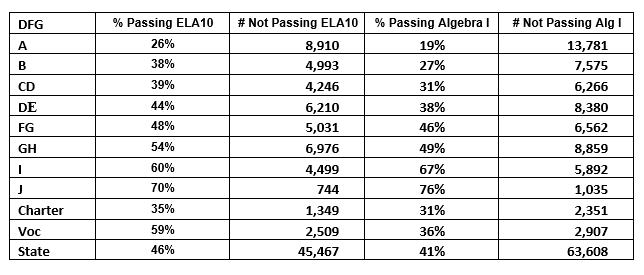NJDOE DELAYS RELEASE OF 2017 GRADUATION PATHWAY DATA
The New Jersey Department of Education (NJDOE) is delaying release of high school graduation pathway data for the class of 2017. Although school districts were required to submit the data to the Department in late October, the NJDOE has postponed Education Law Center’s Open Public Records Act (OPRA) request for the information three times.
The pathway data shows how graduating seniors have been meeting the new diploma testing requirements adopted by the Christie Administration. The data also provides an indication of how many students could be at risk of not graduating as the new requirements are phased in, and transitional options are eliminated.
Under the new rules, students are required to pass the PARCC ELA10 (English Language Arts) and Algebra I exams to receive a diploma. After three years of administration, overall passing rates on these tests remain in the 40% range.
In 2016, the pathway data showed more than 70,000 seniors relied on options the NJDOE is phasing out for current freshmen, the class of 2021. Only 9% of 2016 graduates met the testing requirement by passing two PARCC exams. After 2020, students will no longer be able to use the SAT, ACT or any of the transitional options now available. Unless the rules are changed, tens of thousands of NJ high school students will be at risk of not graduating even if they pass all their courses.
Districts were required to report 2017 pathway data to the NJDOE by October 27. ELC submitted an OPRA request for the data in November. After three extensions, the NJDOE now vaguely says it “hopes” to complete review of the data “within approximately the next month.”
Last year, the NJDOE released the 2016 pathway data three weeks after districts were required to report it. This year the Department is taking three months, possibly more.
The delay comes as the Christie Administration’s new graduation policies face widespread criticism. Governor-elect Phil Murphy has promised to end New Jersey’s reliance on PARCC tests and eliminate standardized testing as a requirement for graduation.
“Last year’s pathway data showed why the Christie Administration’s graduation policies need to be revised before they undermine NJ’s high school graduation rate, which is currently the second highest in the nation,” said Stan Karp, Director of ELC’s Secondary Reform Project. “The 2017 data will likely show the same. It should be released publicly without further delay.”
The graduation rules also face a legal challenge by ELC and the American Civil Liberties Union of New Jersey. The lawsuit, which is pending in the Appellate Division, argues that the new rules violate state law in multiple ways and will have a disparate impact on students of color and English Language Learners.
These concerns are underscored by the PARCC test results. The data below shows 2017 passing rates for the two PARCC exams designated as graduation tests, broken down by “district factor groups (DFG),” the NJDOE’s classification of districts based on wealth and student need. The data shows that students in poorer districts face a much higher risk of not receiving a diploma if PARCC is maintained as the state’s testing requirement for graduation.

“NJDOE often likes to claim its policies are ‘data-driven,’” Mr. Karp said. “The Department should release the pathway data for 2017 to inform discussion about how to change its unsound and illegal diploma rules before they drive NJ graduation rates in the wrong direction.”
Related Stories:
LATEST PARCC RESULTS CONFIRM NEED TO REJECT NEW GRADUATION RULES
CIVIL RIGHTS GROUPS PRESS CHALLENGE TO ILLEGAL GRADUATION REQUIREMENTS
Press Contact:
Sharon Krengel
Policy and Outreach Director
skrengel@edlawcenter.org
973-624-1815, x 24
Press Contact:
Sharon Krengel
Director of Policy, Strategic Partnerships and Communications
skrengel@edlawcenter.org
973-624-1815, x240